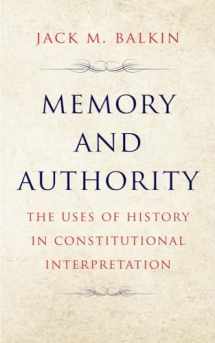
MEMORY AND AUTHORITY: The Uses of History in Constitutional Interpretation (Yale Law Library Series in Legal History and Reference)
Book details
Summary
Description
From one of the nation's preeminent constitutional scholars, a sweeping rethinking of the uses of history in constitutional interpretation
Fights over history are at the heart of most important constitutional disputes in America. The Supreme Court's current embrace of originalism is only the most recent example of how lawyers and judges try to use history to establish authority for their positions. Jack M. Balkin argues that fights over constitutional interpretation are often fights over collective memory. Lawyers and judges construct--and erase--memory to lend authority to their present-day views; they make the past speak their values so they can then claim to follow it. The seemingly opposed camps of originalism and living constitutionalism are actually mirror images of a single phenomenon: how lawyers use history to adapt an ancient constitution to a constantly changing world.
Balkin shows how lawyers and judges channel history through standard forms of legal argument that shape how they use history and even what they see in history. He explains how lawyers and judges invoke history selectively to construct authority for their claims and undermine the authority of opposing views. And he elucidates the perpetual quarrel between historians and lawyers, showing how the two can best join issue in legal disputes. This book is a sweeping rethinking of the uses of history in constitutional interpretation.


We would LOVE it if you could help us and other readers by reviewing the book
Book review



